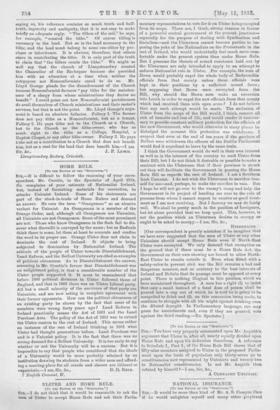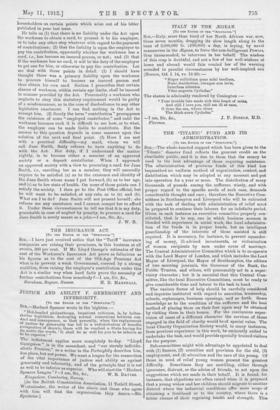NATIONAL INSURANCE. rTo TRIO EDITOR OP TEE " SPECTATOR."1 SIE, — It
would be more than kind of Mr. A. S. Comyns Carr if he would enlighten myself and many other perplexed householders on certain points which arise out of his letter published in your last issue.
He tells us (1) that there is no liability under the Act upon the workman to obtain a card, to present it to his employer, or to take any other step whatever with regard tothe payment of contributions; (2) that the liability is upon the employer to pay the contribution, apparently whether the workman has a card, i.e., has become an insured person, or not; and (3) that if the workman has no card, it will be the duty of the employer to get one for him, or otherwise to pay the contribution. Let me deal with these points in detail. (1) I should have thought there was a primary liability upon the workman to procure himself to become an insured person and thus obtain his own card. Section 1 prescribes that certain classes of workmen, within certain age limits, shall be insured in manner provided by the Act. Presumably a workman who neglects to obey this statutory requirement would be guilty of a misdemeanour, as in the case of disobedience to any other legislative enactment. I can find nothing in the Act to exempt him. (2) Surely the term" contribution" presupposes the existence of some "employed contributor," and until the workman becomes such it is difficult to see how, or to what, the employer can be made liable to contribute. But the answer to this question depends in some measure upon the solution of the next and final point. (3) Here I am met with a practical difficulty—my maid, whom we will call Jane Smith, flatly refuses to have anything to do with the Act. Her duty, if I understand the matter rightly, is to become either a member of an approved society or a deposit contributor. When I approach an approved society with a view to procuring a card for Jane Smith, i.e., enrolling her as a member, they will assuredly require to be satisfied (a) as to the existence and identity of the Jane Smith whose name I put forward, (b) as to her ago, and (c) as to her state of health. On none of these points can I satisfy the society. I then go to the Post Office official, but be will want to be satisfied, at any rate, as to (a) and (b). What am I to do P Jane Smith will not present herself ; she refuses me any assistance and I cannot compel her to afford it. Under these circumstances to tell me that it is my duty, punishable in case of neglect by penalty, to procure a card for Jane Smith is surely meant as a joke.—I am, Sir, &o., J. W. B.











































 Previous page
Previous page